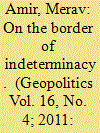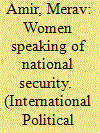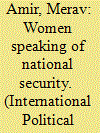| Srl | Item |
| 1 |
ID:
108905


|
|
|
|
|
| Publication |
2011.
|
| Summary/Abstract |
Drawing on a perspective which takes into account the convergences of sovereign and biopolitical ruling apparatuses, the aim of this article is to provide a comprehensive view of the Separation Wall constructed by Israel in East Jerusalem, and, through it, of Israeli control of Palestinian East Jerusalem. Neither a comprehensive border, nor a mere barrier, the Separation Wall which is being constructed in Jerusalem operates to reinstates sovereign power in arrays of governmentality for the purpose of drawing on the ability of sovereignty to appropriate legitimacy for the territorialisation of governmentality. This article claims that these territorialised arrays of governmentality give rise to processes of racialisation, by maintaining a grip on the communities of Palestinians in East Jerusalem and sustaining them in an intermediate position, standing in the way of their full integration into the Israeli population while severing their existing connections with the Palestinians in the West Bank.
|
|
|
|
|
|
|
|
|
|
|
|
|
|
|
|
| 2 |
ID:
136095


|
|
|
|
|
| Summary/Abstract |
The production of reports and the distribution of information have become integral to the operation of many non-governmental organizations. In this regard, the fact that the all-women organization of Checkpoint Watch publishes reports about the Israeli checkpoints in the occupied West Bank seems to comply with current trends. However, the reports—most of which are short repetitive descriptions of the banality and everydayness of the military checkpoints, counting the number of people and cars waiting, commenting on the manner in which the checks are performed and meticulously documenting what mostly amounts to minor incidents of humiliation and distress—do not seem to abide by any convention of reporting. This work analyzes the reporting praxis of the organization and claims that it should be understood as a form of activism in and of itself. Tracking the ways in which the reports address the Israeli public through the concept of parrhesia, the work suggests that this form of reporting enables the women activists to use their gendered marginality to make their way into the highly masculinized and militarized Israeli security discourse.
|
|
|
|
|
|
|
|
|
|
|
|
|
|
|
|
| 3 |
ID:
136097


|
|
|
|
|
| Summary/Abstract |
The production of reports and the distribution of information have become integral to the operation of many non-governmental organizations. In this regard, the fact that the all-women organization of Checkpoint Watch publishes reports about the Israeli checkpoints in the occupied West Bank seems to comply with current trends. However, the reports—most of which are short repetitive descriptions of the banality and everydayness of the military checkpoints, counting the number of people and cars waiting, commenting on the manner in which the checks are performed and meticulously documenting what mostly amounts to minor incidents of humiliation and distress—do not seem to abide by any convention of reporting. This work analyzes the reporting praxis of the organization and claims that it should be understood as a form of activism in and of itself. Tracking the ways in which the reports address the Israeli public through the concept of parrhesia, the work suggests that this form of reporting enables the women activists to use their gendered marginality to make their way into the highly masculinized and militarized Israeli security discourse.
|
|
|
|
|
|
|
|
|
|
|
|
|
|
|
|